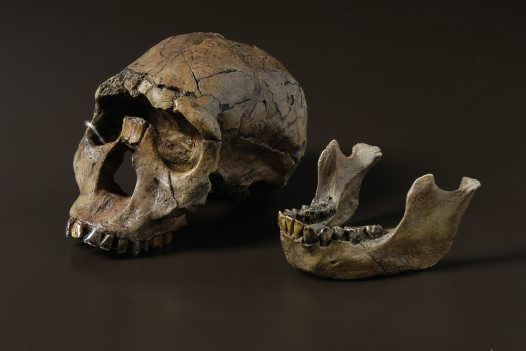How did humankind come to this pass? Not just evolutionarily, which is a fairly straightforward process in a random kind of way. But rather as the separating and separate, fragmenting and fragmented primate standing at what may be a million year crossroads?
The first tools in the fossil record, found in East Africa, date to about 2.5 million years ago. A mere few hundred thousand years later, Homo ergaster, the “plausible ancestor for all subsequent humans” according to anthropologist and author Ian Tattersall, left the only true ‘homeland,’ Africa.
The first wave of our proto-human forebears walked out of Africa about two million years ago, using a very crude stone technology called Oldowan. Forests were shrinking, grasslands were expanding, symbolic thought was developing in a growing brain, and walking upright was an efficient way to cover a lot of ground.
Two million years had elapsed since the “walking chimpanzees” of Lucy fame (Australopithecus afarensis). Climate changes and dietary requirements (brains consume 16 times as much energy as muscle tissue) probably provided the original impetus to leave, perhaps to follow migrating herds of antelope and gazelle.
 Successive waves of migration occurred as new hominid species emerged in Africa, “the continent that, from the beginning, has been the engine of mainstream innovation in human evolution” according to Tattersall.
Successive waves of migration occurred as new hominid species emerged in Africa, “the continent that, from the beginning, has been the engine of mainstream innovation in human evolution” according to Tattersall.
An early offshoot of H. ergaster, Homo erectus, has been found in China dating back nearly 2 million years. The same species has been found in Java dating to as little as 40,000 years ago. If confirmed, modern humans probably drove the first primitive humans to extinction, just as they likely did Neanderthals in Europe.
Bipedalism and the most basic stone technology were apparently enough to start the human story. The ability to scavenge, hunt and gather, and to learn about new animal and plant species in each locality with a growing brain, enabled humans to do what no other animal has ever done: leave the constraints of ecological niche. We left the animal Eden, and became, increasingly, the pillaging primate.
All 7.5 billion humans now on earth evolved from a common stock of about 10,000 people that made the cognitive breakthrough in eastern or southern Africa to ‘fully modern humans.’ Over the long period of evolution to our present form however, different species of humans came into direct contact with each other. That was a gulf immeasurably wider than the violent and tragic encounters between the races in Africa, the Americas and Australia during colonial times. But it probably followed the same pattern.
What happened when the big-brained but slow-adapting Neanderthals encountered the much more technologically and culturally innovative Homo sapiens? Or when modern humans encountered the much more primitive Homo erectus, an even more distant echo of ourselves?
Given humans’ willingness to wage war (now enshrined as a permanent ‘global war on terror’) there was no doubt a lot of conflict and killing going on between humans and actual sub-humans. The biblical or Rousseauean Eden never existed.
Is it our human destiny to be planet killers? If destiny is the past determining the present, the answer is yes. But though destiny is a dead end, another fate is possible for humanity.
An awareness of our evolutionary cul-de-sac has become essential to evolving beyond thought-consciousness. The idea that science and technology can save us is juvenile. Freedom from the darkness of the human past, and present, now requires a conscious transmutation.
Humans are devolving so fast that things appear hopeless. But the very rapidity of our ecological destructiveness and spiritual erosion is providing the impetus to break through the ancient mold of man.
If one focuses horizontally, on current events, the weight of the past is too much. But of one looks within, one feels the crisis of human consciousness without separating oneself from it. Then the way ahead is clear, for oneself as a true individual and for the human species—fully awaken the human brain’s capacity for insight.
Martin LeFevre

